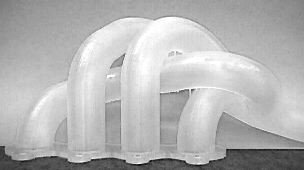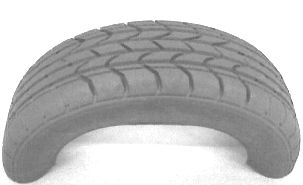NEW PHOTO RESINS FOR RAPID PROTOTYPINGBY Ar UV LASER TAMURA, Yorikazu and HAGIWARA, Tsuneo*, SOLIFORM Photo Resin R&D Department, TEIJIN SEIKI Co., Ltd. KSP D4F, Sakado, Takatsu-ku, Kawasaki, Kanagawa 213, JAPAN Phone: +81-44-813-8700, Fax: +81-44-819-3218
Main purpose of the stereolithography is to get a verification
model from 3D CAD data by using liquid photopolymer. We have been
spending a lot of efforts on creating a new use of the product in
order to expand this technology. As the result, we have already
developed a new root to obtain direct injection molding die by filled
liquid photopolymers, TSR-750 series in 1995. We are greatly
succeeded in the new technology for rapid prototyping. In this paper
we present new type of urethane acrylate photo resins for Ar ion
laser to give a model with high performance or function.
1. Background
The epoxy based photo resin for stereolithography is believed to give
a model with high accuracy. However from the view point of material
source, epoxy compound is limited. On the other hand, new urethane
acrylates are easily available by the reaction of isocyanate with
polyol. We focused on our efforts to develop the new urethane
acrylates for new resins with high performance and functional
properties, such as heat-stability, impact strength, tensile
strength, elongation and etc.
2. Transparent and highly heat-stable resin, TSR-920
The properties of the hardened conventional resin does not have
enough properties and is not reached to that of ABS resin. The users
are anxious to have a resin with a high performance for functional
test or practical parts, even if it is not satisfied with all items
listed in. We have been investigated in the materials having clear
color and high HDT, and developed TSR-920 photo resin. The hardened
resin shows a high heat distortion temperature of 150 °C under
high load, and more than 7 kg/mm2 for tensile strength. It
is very useful not only for the verification model but also for the
mechanical parts. TSR-920 shows unsatisfied property on some items,
we have great expectation in future advance. This will become one of
the important engineering plastic by stereolithography and be used
for wide range rials of manufacturing.
TSR-1910 is consisted of newly synthesized functional urethane
acrylates with acrylate monomers. A concept adopted for the
functional urethane acrylate is to introduce a number of segments to
give high heat stability. The physical properties are shown in the
Table I.
3. Soft and rubber like resin TSR-1920s
It is well known that a great number of rubber or elastomer parts are
produced as industrial products. The amount is estimated more than
one third of plastic product for industrial use. We designed special
multi-functional urethane acrylate which shows elastic character
suitable for rubber like resins. TSR 1920 is consisted of the
urethane acrylates with acrylate monomers. TSR 1920B containing black
additives is also presented for the customer who wants rubber like
black appearance. Hardened TSR-1920s are soft and flexible having
clear or black color with hardness of about 70 in shore A scale,
useful for rubber prototype model with complex shape. The automotive
and electric appliance researchers have very much attention for the
TSR-1920s in making prototypes of inner parts.
4. Super engineering plastic resin TSR-1970X
The newest resin, TSR-1970X is designed for the material which shows
the properties of super engineering plastics. Specially designed
urethane acrylates and fillers are used for the resin. The filled
resin will be important when it is used for making special parts
needed for super engineering plastics. Thermal expansion coefficient
of linear index is very small equal to filled superengineering
plastics. Tensile and flexual modulus show quite large and equal
level to the steel.
5. Optical and physical properties of TSR-920, 1920 (B) and 1970X
Optical and physical properties of TSR-920, 1920 and TSR-1970X are
shown in Table I. The critical exposure (Ec) of them are small,
showing typical urethane acrylate photo-resin. E10 is about 40~50
mJ/cm2. Viscosity of TSR-1970X is quite high, almost
slurry. Mechanical properties of each TSR resin are quite
interesting. They have characteristic profiles in each
properties.
Table I. Optical and physical properties of TSR-920, 1920 (B) and
1970X
|
Resins |
TSR-920 |
TSR1920 |
TSR-1970X* |
ABS Resin |
AMODEL** |
|
|
Base resin |
Urethane |
Urethane |
Urethane |
- |
- |
|
|
Viscosity(cps) |
1,700 |
500 |
56,000 |
|||
|
Ec(mJ/cm2) |
13.3 |
15.4 (14.8) |
2.7 |
|||
|
|
Tensile strength (kg/mm2) |
7.5 |
0.8 |
12.3 |
4-6 |
21.1 |
|
Appearance |
Clear |
Clear |
Grey opaque/ |
|||
|
Usage |
Special model |
rubber model |
Special model |
|||


This paper was presented
at RadTech97 Yokohama.